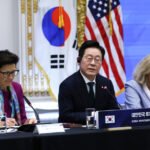Where on earth do people get the idea that the Korean government directly subsidizes cultural content, when government budgets are run transparently?
Back in the 2000s when the Korean Wave took off in Japan, the Japanese media pushed the false narrative that the reason Korean dramas were popular because of government funding.
Western outlets simply echoed that, and to this day it has never been corrected.
When Western media talk about the Korean Wave, they always mention government support — yet not a single report ever provides numbers or concrete examples.
Why? Because in reality, it was nothing more than “cheerleading.”
In reality, the sector that actually did receive government funding—film—is now in decline.
For dramas and K-pop, the government’s main approach was basically “stay out of the way.”
If anything, the extent of support was limited to things like providing drama shooting locations.
Japan, on the other hand, poured enormous sums into its “Cool Japan” initiative,
far more than Korea ever did.
While Korea’s support was mostly aimed at nurturing its domestic pop culture industries,
Japan explicitly allocated budgets to promote itself overseas.
And yet on Reddit, the narrative persists:
Korea supposedly “forces” its cultural exports through marketing because of its small domestic market,
whereas Japanese culture was just “naturally imported” abroad thanks to its greatness and large home market.
Why is that?
Why do people keep believing in situations that are the exact opposite of the truth?
submitted by /u/wookira
[link] [comments]















